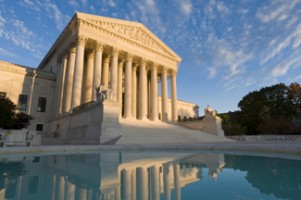Supreme Court cancels oral arguments on March travel ban, asks lawyers to address mootness

U.S. Supreme Court Building/Shutterstock.com.
The U.S. Supreme Court has canceled Oct. 10 oral arguments on the constitutionality of a travel ban that was revised on Sunday by President Donald Trump.
The Supreme Court order on Monday directed the parties in the travel ban case to address “whether, or to what extent” the president’s latest order makes the pending Supreme Court case moot. The briefs are due Oct. 5. Politico and the New York Times have stories, while SCOTUSblog links to the order.
The Supreme Court was considering whether the travel ban, issued in March, violated the establishment clause by disfavoring the Muslim religion and whether it violated federal immigration law. The March order had banned for 90 days new visas for travelers to the United States from six Muslim-majority countries: Iran, Libya, Somalia, Sudan, Syria and Yemen. It also imposed a 120-day ban on refugees.
The 90-day ban on travelers from the six countries expired on Sunday, and the replacement announced the same day addresses only that portion of the travel ban. The Supreme Court order directs lawyers to address whether the case is moot as a result of Sunday’s replacement policy, and as a result of the upcoming Oct. 24 expiration of the refugee order.
The travel ban announced Sunday is more targeted than the one it replaced. Five of the Muslim-majority countries remain on the list with Sudan having been dropped. North Korea, Chad and Venezuela have been added to the list, though the travel ban for the South American country applies only to certain government officials and their family members.
The new restrictions are based on whether the countries share information, including information about terrorists, and whether they have adequate security initiatives, such as electronic passports to combat fraud.
Even if the Supreme Court decides the case is moot, there will likely be a new round of litigation concerning the latest order, the Times points out.
Travel ban opponents claim the new version is still unconstitutional, the Los Angeles Times reports. The latest travel ban is “nothing but an extension of the same discriminatory policy,” according to a statement by the National Iranian American Council.
Becca Heller, director of the International Refugee Assistance Project, told the Los Angeles Times that one of the new countries on the list, Chad, is also a Muslim-majority nation. She saw little impact from adding North Korea and Venezuela to the list, since the restrictions on Venezuela are limited and travel from North Korea is “already basically frozen.”
“This is still a Muslim ban,” Heller said.
But Cornell law professor Stephen Yale-Loehr said the new travel ban addressed some concerns highlighted in previous litigation.
“The proclamation goes into depth about how the administration conducted its survey of other countries’ identity management and information-sharing protocols,” he said. “The proclamation bars only certain people from certain countries, not everyone from a given country. The proclamation includes North Korea and Venezuela, two non-Muslim-majority countries.”
Updated on Sept. 26 to report that the briefs are due Oct. 5 and the refugee ban expires Oct. 24.



